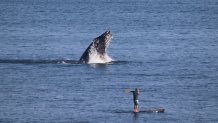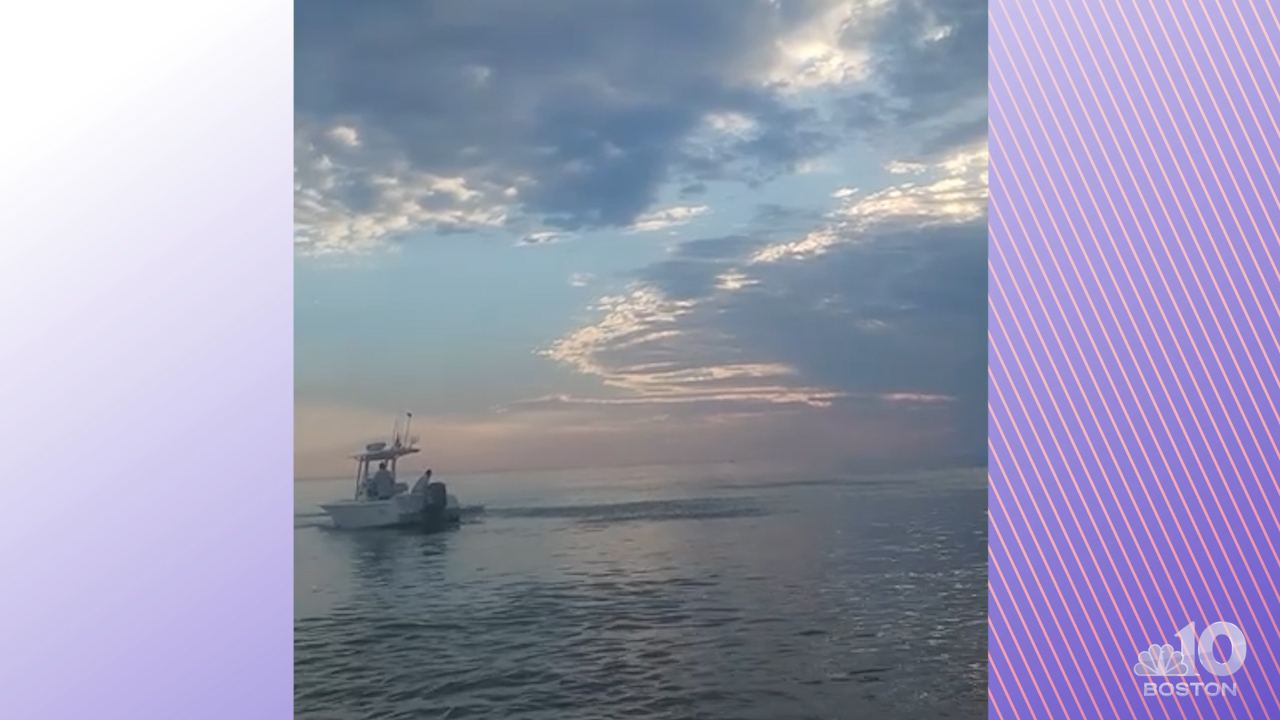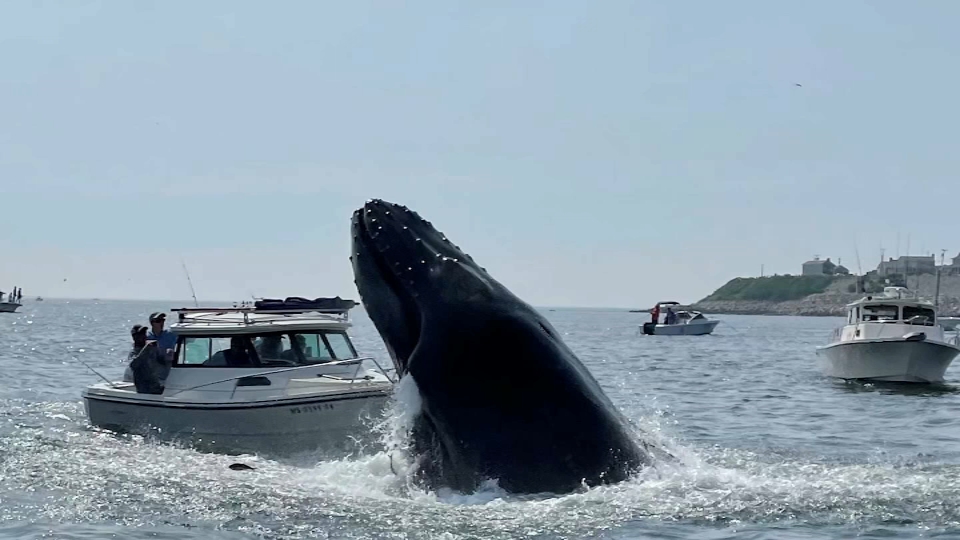The videos are dramatic — whales and boats colliding on the water off Plymouth, Massachusetts, over the past week.
Footage and photos of a humpback whale jumping out of the water and landing on a boat Sunday has been seen around the world. But it's just one of many whale sightings, prompted by an apparent feeding frenzy under the waves, that have caused a frenzy above the waves as well this month.
In fact, the Plymouth harbormaster had been monitoring the area since 5 a.m. Sunday to ensure boaters' safety after a boat was bumped by a whale on Friday in another caught-on-camera incident.
While whales can be marvelous creatures, many kinds of marine life are protected under the federal laws that require people to keep a wide berth away from protected animals — including humpback whales.
"It is important to remember that vessel strikes not only can harm the whale but also be dangerous to humans and vessels as well. It is vital to stay at least 100 yards away from whales to minimize any potential interactions," the nonprofit Whale & Dolphin Conservation said in a statement Monday.
What's bringing whales to Plymouth?
Sunday's cetacean belly-flop was one of several close encounters reported in Plymouth this month, especially near Manomet Point.
Those who know the area, with some having fished there for decades, told NBC10 Boston they have never seen something like this before.
There was the boat bumped by the whale on Friday, in video captured by a paddleboarder, Bob Babcock. He told NBC10 Boston he's logged hundreds if not thousands of hours paddleboarding over 16 years and has never seen so many whales so close to shore.
Another incredible image earlier in the week showed a whale breaching near a different paddleboarer.

The whales spotted off southern Massachusetts this July have been humpback whales, between 35 and 55 feet long and up to 40 tons, according to Whale & Dolphin Conservation, whose North American office is based in Plymouth.
They come to Massachusetts as they migrate, and they're eating small bait fish, which they're known to follow close to shore — though not usually this close, according to the nonprofit. It executive director said that the apparent breaches are actually a feeding strategy that lets them snatch up a lot of prey in one big gulp.
"From what we have seen, there is not a lot of 'breaching' going on but rather lunge feeding which is based on where the fish are schooling," Regina Asmutis-Silvia said in a statement. "Feeding whales are often distracted whales making it more important for boaters to be watching for them as the whales are very focused on fish at that point, not boats."

Is it safe to whale watch in Mass.?
Boats have appeared to crowd the area around Manomet Point as whale sightings increased, and for recreational fishing — the abundance of bait fish that is attracting whales is also bringing out sport fishers, Plymouth Harbormaster Chad Hunter noted.
"They've been out there for the last three days continuously so there's a lot of whales, but they're also attracting a lot of boaters, which creates a problem obviously after today," longtime boater Chris Grant said Sunday. "They're beautiful creatures but you know, you gotta keep their distance, they are still animals you know?"
Perhaps, then, it's no wonder that there was a collision.
"I've been watching these whales for weeks feeding among the fishing boats and feared this would happen," shark researcher John Chisholm tweeted Sunday.
The close encounter, now under investigation, occurred around 10 a.m. off the coast of White Horse Beach, and the 19-foot boat, which the whale nearly capsized, only had light damage to its bow, Hunter told NBC10 Boston. It was able to get back to a ramp on its own power, no one on board was hurt — avoiding what could easily have been a bad outcome.
“The boat was in the right place at the wrong time. This could have been much worse for all involved," Hunter said. "Children like to lean over the side of the boat to watch the fish, so it is very lucky that nobody got hurt here. An incident like this is pretty rare but very dangerous to boaters.”
On Monday, signs were up reminding boaters of the danger whales can present. People are also supposed to keep at least 100 yards from humpback whales and other marine life protected under the Endangered Species Act and the Marine Mammal Protection Act.
Federal guidelines for viewing marine life note that it can be exciting to see animals in the wild.
"Although it can be tempting to try to get close to these marine animals, it's always best to view them from a safe and respectful distance for their safety—and yours. Learning how to interact with and observe ocean animals can help you make the right decisions when you encounter them by water, land, or air," NOAA says.
Whale & Dolphin Conservation recommends people grab their binoculars or zoom-equipped cameras and check out the whales off Plymouth from land on Manomet Point or White Horse Beach. Anyone on a boat should always keep work to prevent collisions with whales, which can be at least twice the size of their vessel.
"The whales are moving sporadically while trying to catch fish, so boat operators in the area should be proactive and make sure they are keeping at least 5 boat lengths away," said Monica Pepe, the nonprofit's safe boating policy manager, in a statement.



